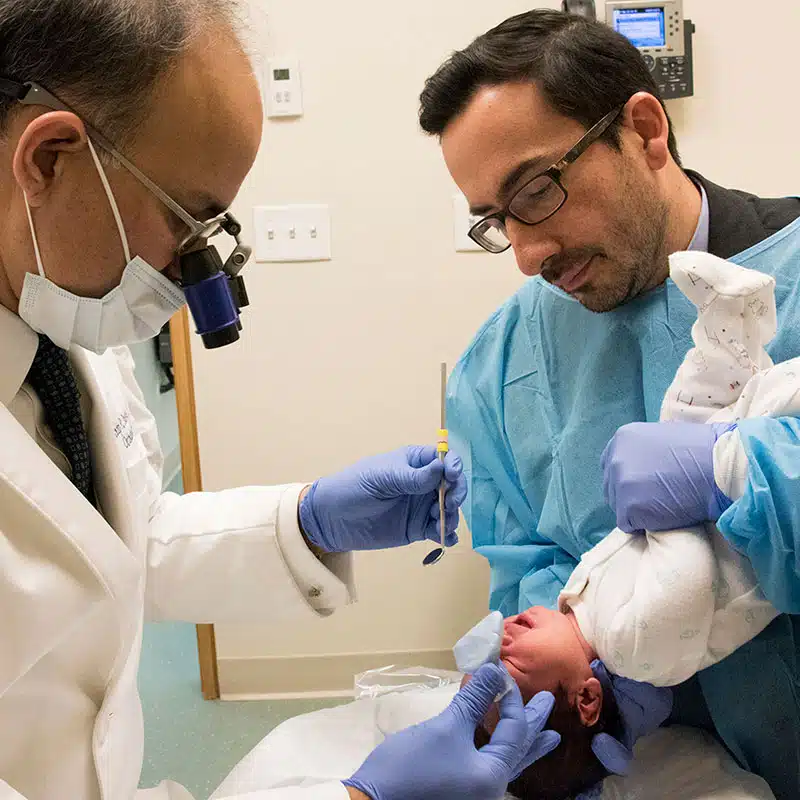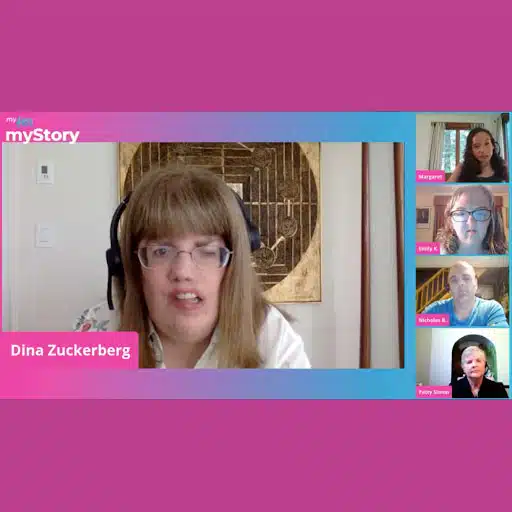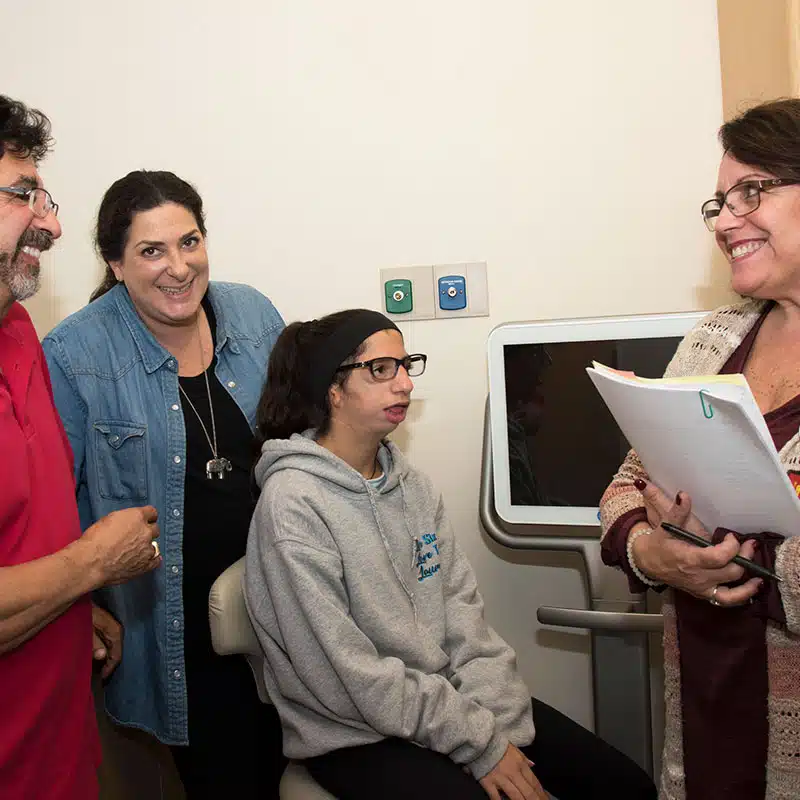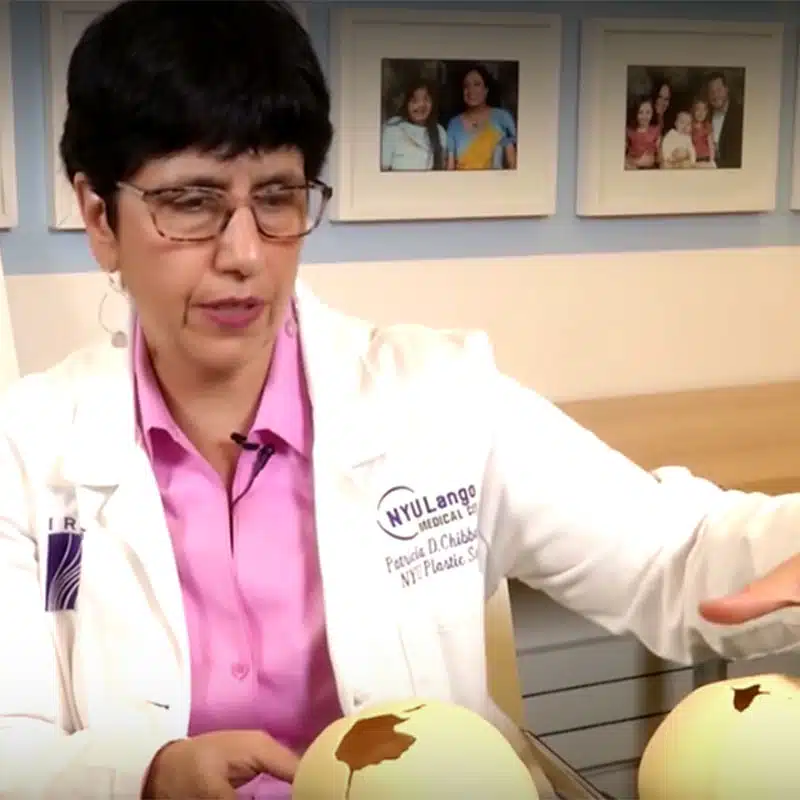Beckwith-Wiedemann Syndrome
Condiciones craneofaciales > Beckwith-Wiedemann Syndrome
What is Beckwith-Wiedemann Syndrome (BWS)?
Beckwith-Wiedemann Syndrome (BWS) is a rare congenital disorder that arises during fetal development, affecting various aspects of growth and development. It is typically caused by genetic abnormalities affecting chromosome 11, leading to disruptions in normal growth regulation processes.
The underlying genetic and molecular mechanisms of BWS result in complex clinical manifestations, necessitating comprehensive medical management and ongoing support for affected individuals and their families.
Beckwith-Wiedemann Syndrome (BWS)
Prevalencia: BWS affects between 1 in 10,000 to 1 in 13,700 live births globally.
Causas: The majority of BWS cases occur sporadically, with no clear familial inheritance pattern, but in some instances, it may be inherited in an autosomal dominant fashion.
Developmental Effects: BWS can cause gigantism, enlarged tongue, abdominal organ enlargement, umbilical hernia, adrenal gland enlargement, neonatal hypoglycemia, advanced bone age, distinctive facial features, and increased cancer risk.
Tratamiento: Treatment options include surgical intervention, such as amputation or reconstructive surgery, tailored to address specific needs, with multidisciplinary care teams collaborating to provide comprehensive support.

Lateralized Growth
How does Beckwith-Wiedemann Syndrome affect a child’s development?
Beckwith-Wiedemann Syndrome can have a profound impact on a child’s development and overall well-being. The physical features and associated medical conditions associated with BWS may present challenges in infancy and childhood, including feeding difficulties, speech delays, and surgical interventions. Additionally, the potential for developmental delays, learning disabilities, and psychosocial challenges may require early intervention and ongoing support from healthcare professionals, educators, and caregivers.
Despite the challenges posed by BWS, many individuals affected by the condition lead fulfilling lives with appropriate medical care, supportive interventions, and access to resources that promote optimal development and quality of life. Ongoing research into the underlying genetic mechanisms and clinical management strategies for BWS holds promise for further improvements in diagnosis, treatment, and outcomes for affected individuals and their families.
Prevalence and Rarity
Beckwith-Wiedemann Syndrome is considered a rare disorder, with an estimated prevalence of approximately 1 in 13,700 births worldwide. However, the true incidence may be higher due to underdiagnosis or misdiagnosis of milder cases. BWS affects individuals of all ethnicities and has no known gender predilection.
Characteristics of Beckwith-Wiedemann Syndrome (BWS)
In many individuals with the disorder, associated symptoms may include:
- Gigantism – excessive size and height
- Macroglossia – an unusually large tongue
- Visceromegaly – enlargement of abdominal organs, such as the liver and spleen (hepatosplenomegaly)
- Umbilical hernia [exomphalos] or Omphalocele – protrusion of part of the intestines through a defect in the abdominal wall at the umbilicus or navel
- Adrenocortical cytomegaly – enlargement of cells within the outer layer of the adrenal glands
Additional features may include low blood sugar levels within the first days of life (neonatal hypoglycemia); advanced bone age, particularly up to age four; the presence of distinctive linear grooves within the ear lobes and/or other abnormalities of the head and facial area; and/or an increased predisposition to certain childhood cancers.
(National Organization for Rare Disorders, Inc, 2000)
Causes of Beckwith-Wiedemann Syndrome
Beckwith-Wiedemann Syndrome (BWS) is primarily caused by genetic abnormalities affecting a specific region of chromosome 11. Most cases of BWS occur sporadically, meaning they are not inherited from a parent but arise from spontaneous genetic changes during early development. However, in a minority of cases, BWS may be inherited in an autosomal dominant pattern, meaning that a child has a 50% chance of inheriting the genetic mutation from an affected parent.
The majority of BWS cases are associated with alterations in a region of chromosome 11 known as 11p15.5. These alterations can involve changes in DNA methylation, chromosomal duplications or deletions, or mutations in specific genes within the region, including the KCNQ1OT1, CDKN1C, and IGF2 genes. These genetic changes disrupt normal growth regulation processes during fetal development, leading to the characteristic features of BWS.
Opciones de Tratamiento
Treatment for Beckwith-Wiedemann Syndrome is primarily focused on managing the specific symptoms and associated medical conditions that may arise in affected individuals. Multidisciplinary care teams, including pediatricians, geneticists, endocrinologists, surgeons, and other specialists, collaborate to provide comprehensive care tailored to each patient’s needs.
Treatment interventions for BWS may include:
- Monitoring and Management of Associated Conditions: Regular screening and surveillance for conditions such as neonatal hypoglycemia, abdominal organ enlargement, and childhood cancers are essential for early detection and intervention.
- Surgical Correction: Surgical intervention may be necessary to address complications such as umbilical hernias, omphaloceles, or tongue reduction surgeries to alleviate symptoms associated with macroglossia.
- Hormonal Therapy: In some cases, hormone replacement therapy may be recommended to address endocrine abnormalities associated with BWS, such as growth hormone deficiency or adrenal insufficiency.
- Genetic Counseling: For families affected by BWS, genetic counseling can provide information about the underlying genetic cause of the condition, recurrence risks, and family planning options.
Durante casi 70 años, myFace ha trabajado con pacientes y familias para brindar atención y apoyo integrales. Además de brindar acceso a atención médica de vanguardia, myFace brinda otros servicios importantes, como grupos de apoyo emocional, talleres y seminarios web educativos que ofrecen orientación, asesoramiento y recursos para pacientes, familias y la comunidad craneofacial en general en todo el país.







